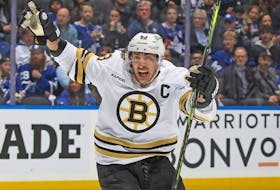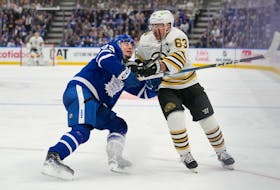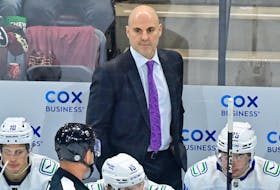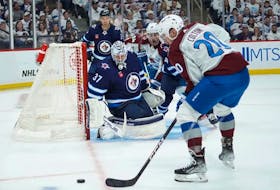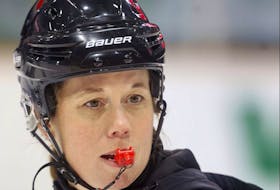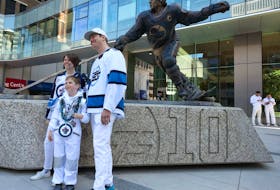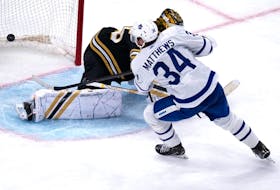Through much of the 1960s, they were the great unknown to Canadian hockey fans.
Canada’s best amateurs, gathered together by Fr. David Bauer, were well aware of the Soviet Union hockey teams, which put together a string of nine straight world championship gold medals starting in 1963.
But the Russians were playing against senior hockey players, Canadians disputed, so really, how good were they?
In early winter of 1966, Newfoundland hockey fans got a first-hand glimpse at what all the fuss was about.

That’s when the Soviet national team played a pair of games against the Corner Brook Royals and St. John’s Capitals, thumping the two senior hockey teams by a combined 46-1 score.
This was the same Soviet squad that cruised through the world championship at 6-0-1 in the spring of ‘66, scoring 55 goals whilst allowing only seven. It was also the same tournament that George Faulkner of Bishop’s Falls led third-place Canada in scoring.
Fifty-two years have passed since those two historical hockey games were staged at Corner Brook’s Humber Gardens and Memorial Stadium in St. John’s — both rinks now supermarkets — but the one lasting memory, on this end of the province at least, remains the same: the lone goal the Russians surrendered against the Caps on Boxing Day 1966.
It was the night the roof quite nearly lifted off the Stadium.
“They say it was the loudest cheer ever heard in the building,” says the architect of that goal, George Spracklin, who scored on a third-period breakaway.
“I’d never heard anything like it,” said the Caps’ diminutive goalie, Eg Billard. “You’d think we’d have scored in overtime to beat ’em.”
No one knows for certain how it was the Soviets arrived in Newfoundland for the two games, but it’s suspected the late Don Johnson, who was elected president of what was then known as the Newfoundland Amateur Hockey Association in ‘66, had something to do with it.
Nine years later, Johnson would become the first from Newfoundland to ascend to the top post of the Canadian Amateur Hockey Association.
What is known, through old Telegram clippings, is the Russians opted to tour Canada and play in the CAHA’s Centennial tournament in Winnipeg rather than take part in the annual Colorado Springs tournament in the U.S.
The move was in protest of America sending troops into Vietnam.
Given the frequency of Russian Aeroflot flights landing in Gander, it can be assumed the Soviets decided to use Newfoundland as a chance to get in some pre-tournament competition.
But it was hardly competitive.
Three days before Christmas, the Soviets landed in Stephenville after weather prevented them from touching down in Gander.
The next night, a Friday evening, the Russians wiped the Humber Gardens ice with the Royals by a 28-0 count.
This was the same Corner Brook squad that was the reigning Herder Memorial Trophy champion.
One of the shell-shocked Royals goalies that evening, junior-aged Doug Grant, would go on to bigger and better things with the Detroit Red Wings and St. Louis Blues.
Following the game in Corner Brook, the Russians boarded a bus and headed for St. John’s, where the Caps would be the Boxing Day sacrificial lamb.
“Naturally,” Spracklin says today, “Memorial Stadium was closed Christmas Day. But they demanded that the building be opened so they could practice.
“That didn’t happen, of course, and I think they actually went the diplomatic route to see if they could get it opened.

“First time in 365 days they didn’t practice.”
George Spracklin, a native of Glace Bay, N.S., arrived in Newfoundland in December 1964. He’d barely landed when the Mounties’ top man in St. John’s, a big hockey fan, asked Spracklin if he’d played.
By this time, a few Cape Bretoners were toiling in the provincial senior hockey ranks. Hughie Wadden, Mort Verbiski and Frank Walker were stalwarts with the Buchans Miners.
“I played in civic service league, and we won it all my first year,” Spracklin recalls. “The Mental Hospital had a team. The firemen. We had a real good team. I remember playing the London, New York and Paris (a department store in the city back then) in the final. They even brought in Ford Metcalfe to try and beat us.”
Turns out Caps coach Howie Meeker heard about the young Mountie, and coaxed him out to practice the next season. Paul Saulnier, another RCMP guy, also played for St. John’s.
“That was good public relations for the RCMP to have guys on the Caps,” said Spracklin, before adding with a chuckle, “I got playing, and then I could never get a transfer.”
In the fall of ‘66, plans were in place to host to the Russians over the Christmas holidays. As we said, no one really knew much about the team, other than they were Communists who were virtually unbeatable at the world championship.
How good was that particular team? Put it this way: six players from the squad played with the Soviet Union team that took on Canada’s best pros (minus an injured Bobby Orr) and came up a bit short in 1972 — a young Alexander Yakushev, only 19 at the time, who would eventually skate into legendary status; Victor Zinger (Vladislav Tretiak’s backup); Alexander Ragulin, Russia’s equivalent to Orr; International Ice Hockey Federation Hall of Famer Vyacheslav Starshinov, and Vladimir Vikulov and Yevgeni Zimin, both of whom were later inducted into the Soviet and Russian Hockey Hall of Fame.
“It was a joke, really,” says Billard from Florida, where the 78-year-old former puckstop spends his winters these days. “We were in over our heads, no doubt about it.
“Meeker didn’t say much before the game, other than go out and enjoy it, that it’s a once-in-a-lifetime experience. I think he kind of knew what was ahead of us.”
Meeker later told the late Telegram sports scribe Pee Wee Crane, for whom the senior hockey rookie of the year trophy is named, “I could be wrong, but I don’t think an NHL team could score 20 goals on us.”
The Russians hit the Stadium ice and displayed a brand of hockey equally foreign to the locals. They came at Billard and Tols Chapman in waves, weaving up the ice and moving the puck with a surgeon’s precision.
“It was like they had it on a string,” said Billard. “Everything was on the tape. We’d never seen anything like it.”
Billard knows how many goals he surrendered, but he’s not saying, not even 50-plus years later.
“I don’t want to make Chapman look bad,” he says with a mischievous giggle.
“They were like a machine,” said Spracklin, now 76 and still in Ottawa, where he’s lived since transferring out of Newfoundland in 1972. “You’d be a left-winger, watching the right defenceman, and next thing you know, he’s not there. But there’s a forward in his place.
“They just weaved around, and of course they were all in amazing shape. You couldn’t hit them because they were like brick walls.”
Said Meeker afterwards: “One of the things I noticed mostly was the strength of their bodies from the waist up. They just pushed our guys off.”
Metcalfe, coming off a junior league scoring championship the previous season, was full of piss and vinegar, and eager to get the crowd into it.
Realizing that getting a goal against this bunch would be easier said than done, Metcalfe figured he’d do the next best thing.
“I said to the fella next to me on the bench — I can’t remember who it was — ‘By jeez, I’m going to get a roar from this crowd.’ I picked out the smallest fella on the ice, and I took after him. I hit him, and bounced off him like a rubber ball. It was like hitting a light pole.
“Needless to say, I didn’t go after the biggest fella.”
By the third period, Russia led 16-0. So bombarded were Billard and Chapman, the goalies changed on the fly during one brief moment when the Caps had possession of the puck.
They faced a combined 53 shots.
“I think I touched the puck twice all night,” Metcalfe said.
It’s common in today’s game, but defencemen didn’t pass the puck back and forth to each other at the blueline back then, and certainly not here in Newfoundland senior hockey.
Ragulin, one of the all-time great Russian rearguards, joining Vyacheslav Fetisov and Valery Vasiliev, liked to make lateral passes to his defence partner, and Spracklin took notice.
“The right defenceman, over to the left defenceman. Into the corner, and around the net. Much the same way the game is played today, but certainly not like it was then.
“They were like darn robots the way they moved the puck around.
“Anyway, the puck came to Ragulin and I thought he might throw it over to his defence partner. I just put broke through the middle, put my stick down and sure enough, the puck’s on my stick and I’ve got a breakaway.”
Spracklin was smooth sailing from the Caps’ blueline.
But …
“I could hear Ragulin coming behind me like a herd of buffalo. They were all strong, powerful skaters. I’m thinking I’d better deke or shoot and get the hell out of there real quick.”
Spracklin elected to deke, and beat Victor Konvalenko before throwing the puck upstairs.
The roar of the crowd was thunderous. Chances are the Queen’s portrait shimmied a little.
Those who were there have never forgotten the moment.
The goal seemed to anger the Russians, who would add another couple of goals late in the third for an 18-1 final.
Still though, virtually all of the 3,000-plus fans on hand left the Stadium happy.
Many years later, when the St. John’s Maple Leafs officially closed the Stadium in 2001, the Spracklin goal was remembered, and the subsequent applause that shook the foundation.
The Caps had played international exhibition games prior to the Russians’ arrival, against the Polish and German national teams. And while the visitors came out on top each time, the Soviets were in a league of their own.
Years later, there would be more international games at the Stadium.
Sometimes it was a select team of second-rate all-stars, and other times it was a club team such as Sokol Kiev in 1982 and Moscow Dynamo in ‘85. A Soviet midget team also played at the Stadium in the 1980s.
Good as they were, they were no match for the likes of Alexander Yakushev and Alexander Ragulin.
Funny, though, but on that Boxing Day night all those years ago, in a game that ended 18-1, it’s the guy who scored for the losing team that many fans still remember today.
Robin Short is The Telegram’s Sports Editor. He can be reached by email [email protected] Follow him on Twitter @TelyRobinShort

